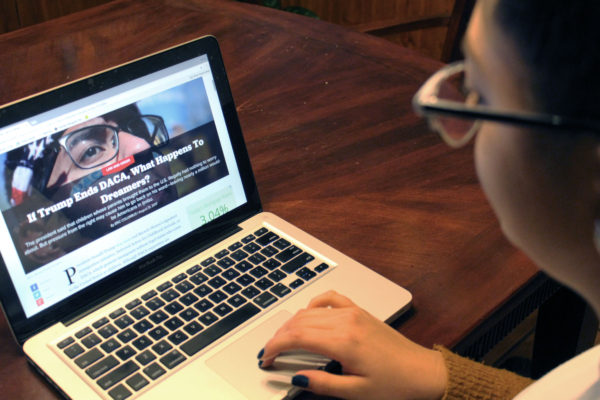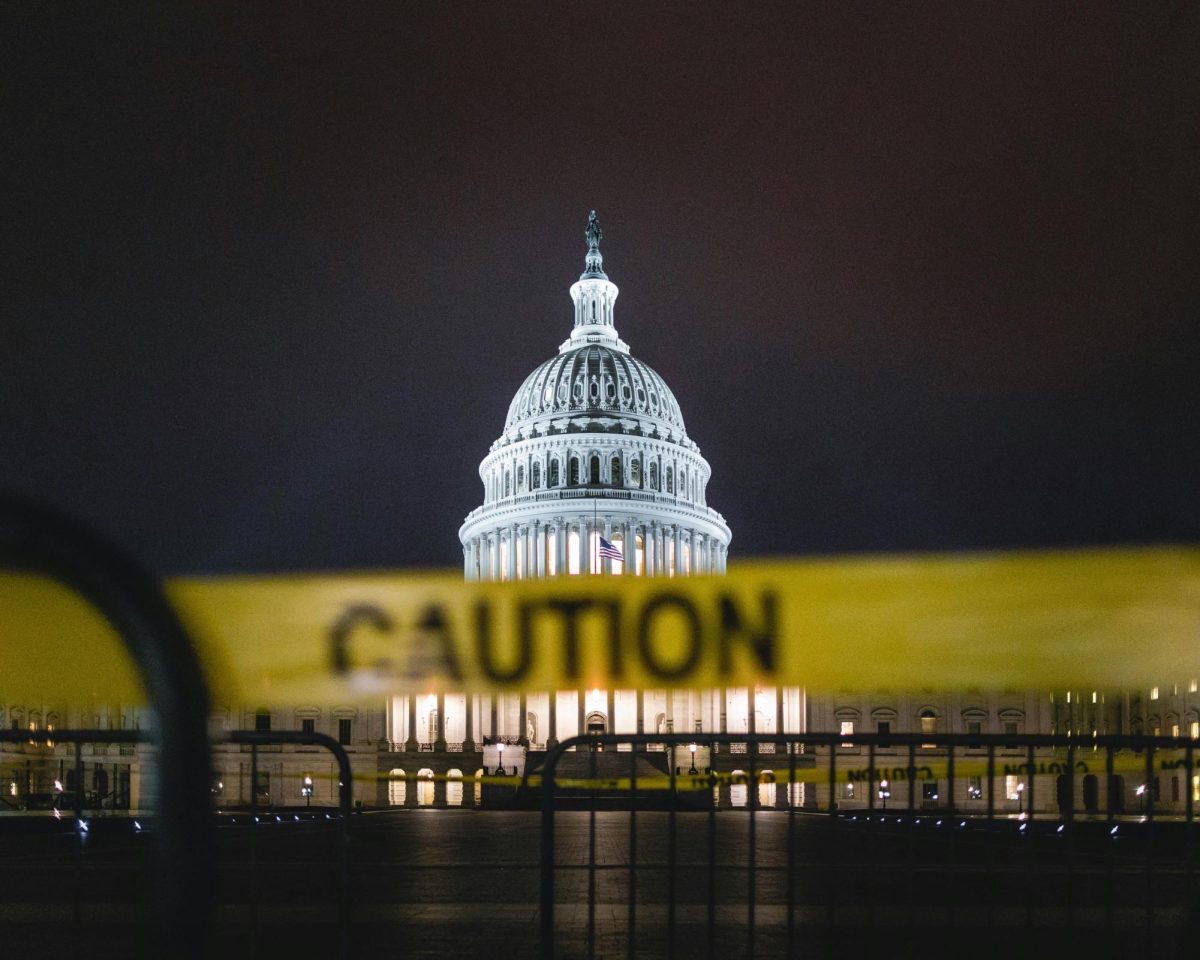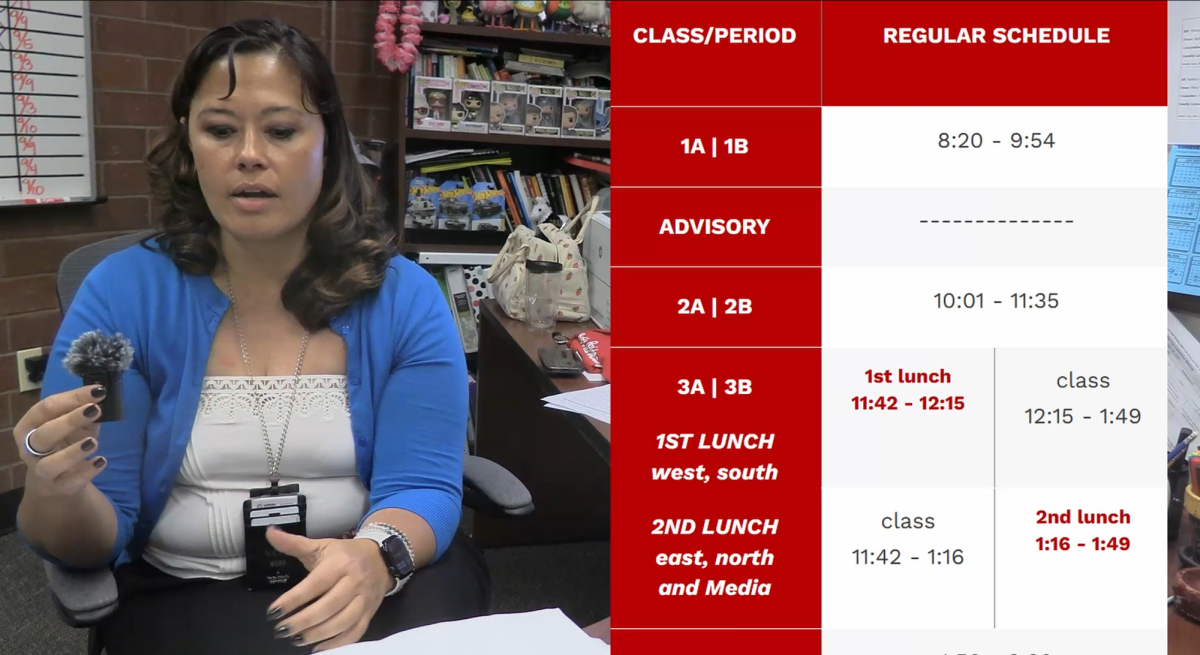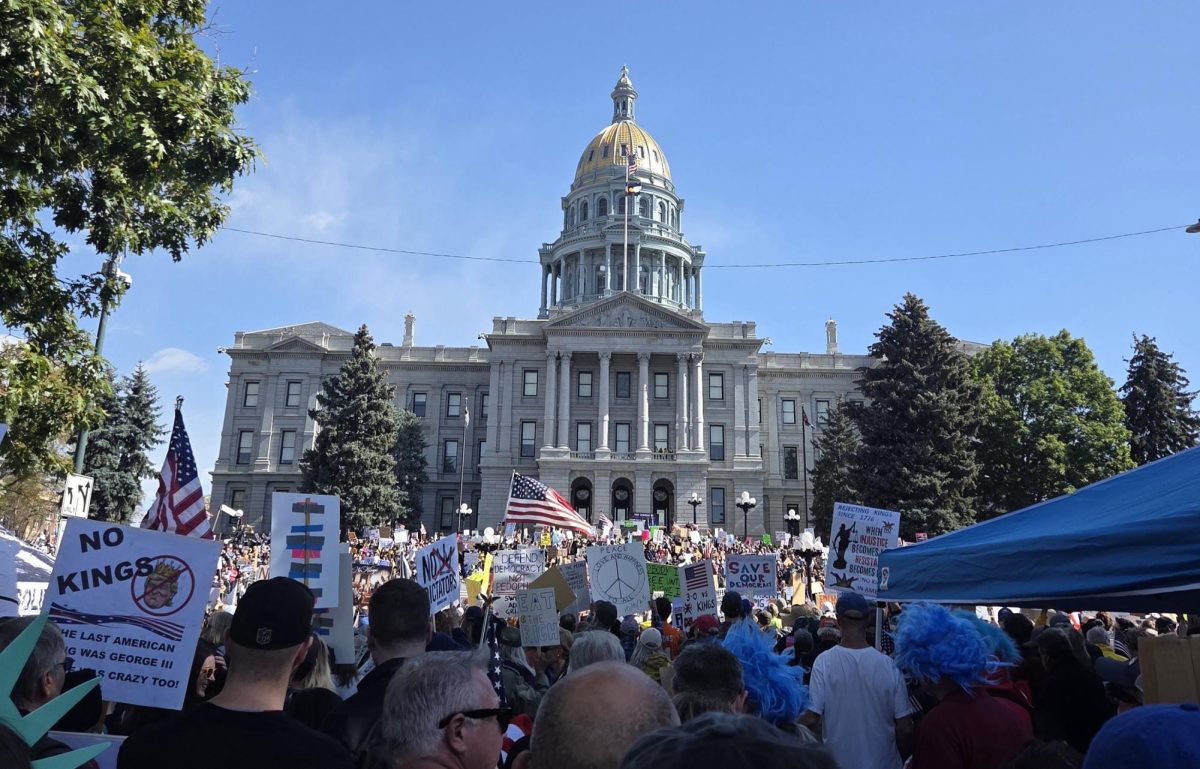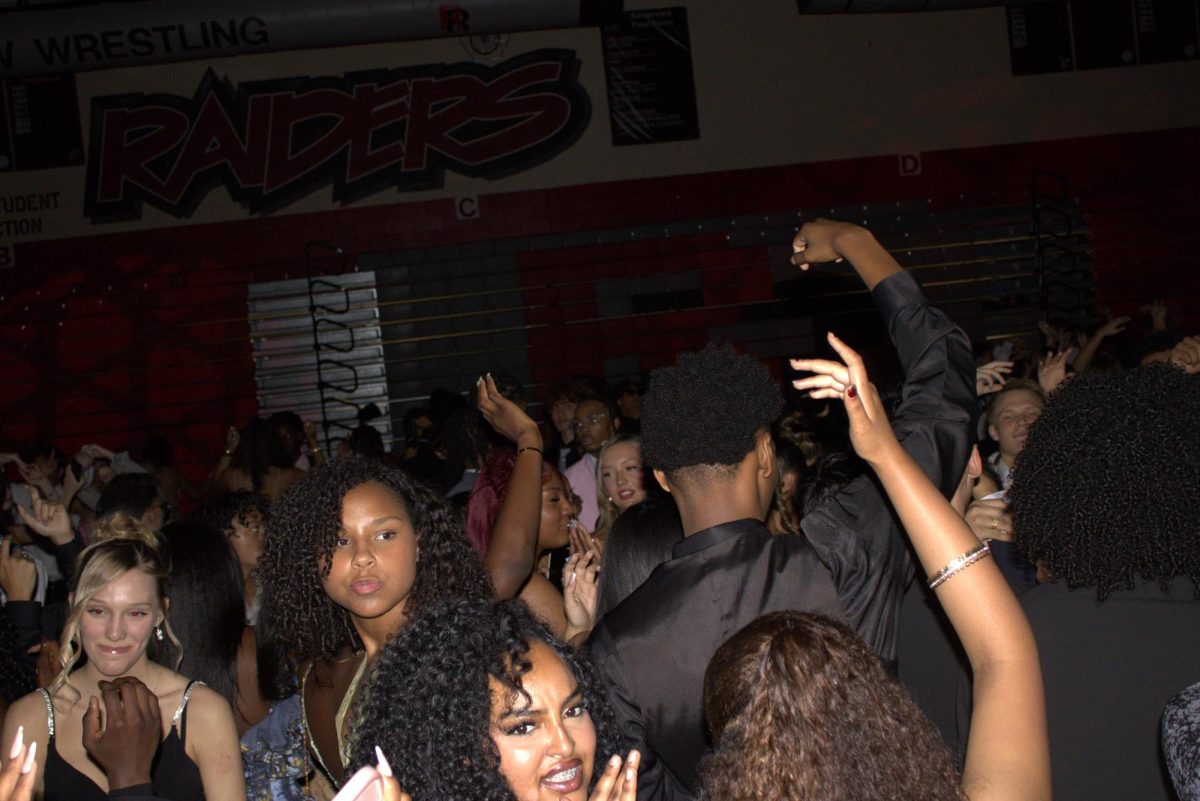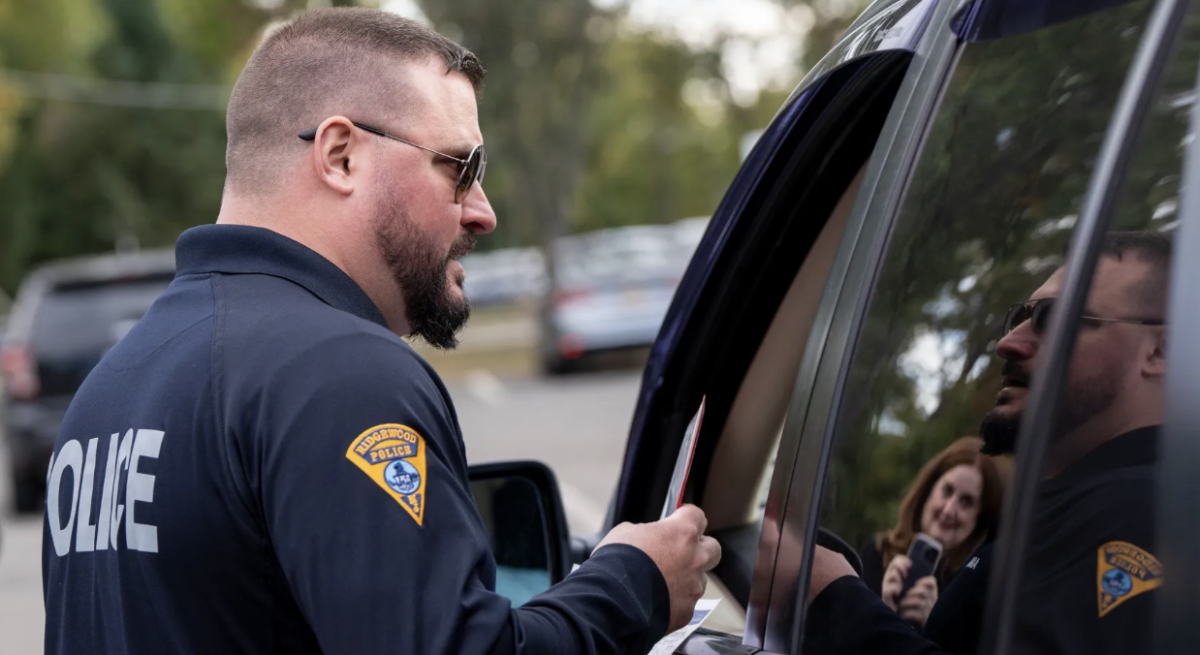Feature Photo By: Jessica Rangel– Maria Rangel, a DACA recipient, reads about the affects of President Trump’s decision to end DACA. DACA is the Deferred Action for Childhood Arrivals executive action in the United States.
September 5th, 2017. I’m in the living room watching the disbelief on my parents face as their eyes are glued to the news that’s blaring on the TV. Everything is silent and the only voice that fills the room is the news broadcaster announcing President Trump’s decision to end DACA. My sister, already in tears, runs up the stairs to her room. I sit there helpless, knowing that this is going to impact the future of my family forever.
I was born right here in Aurora, Colorado, but my family unfortunately wasn’t. My parents are from a small town in Mexico and brought my two older sisters and anything they could fit in their luggage to the United States. It wasn’t an easy choice to leave everything behind in Mexico, yet my parents believed it was something they had to do for their family.
After solely being in the US for a year, I came along and my parents couldn’t be any happier to have another daughter.
For awhile, I wasn’t different from my family.
Being documented or undocumented didn’t mean anything until the moment my mother told me, “‘Honey your sisters’, Dad, and I, we’re not from here. We don’t have papers like you and because of that the government is trying to kick us out. If one day we don’t come home you have to call your uncle, okay?”
Hearing that at just 5 years old, I was already frustrated with the idea of someone being able to tear my family apart because they weren’t citizens. From that point on I was afraid of never seeing my family again and when the cops would drive by, I would panic knowing my parents didn’t have a license to provide if we got pulled over. It was very difficult growing up frightened by the people that were supposed to be helping me.
Not only did I grow up seeing my parents struggle, but I also encountered the hardships my sisters faced learning a new life in America. My sisters had no say in whether they wanted to move and had no idea how much more difficult it would be for them in the U.S.
Despite that, they fought hard and looked for ways to continue as much of a normal life as they could. Soon, they blended in and could hardly recall the couple of years they had lived in Mexico. America became the only home my sisters knew for more than half of their lives.
There was a moment when both of my sisters felt as if they couldn’t keep trying to fit into this country. They are older now — both in their 20’s — but they couldn’t move on with their lives without being able to get stable jobs or a college education. That was until former President Obama created DACA (the Deferred Action for Childhood Arrivals) which allowed undocumented people in the U.S. the opportunity to be protected from the government under a work permit.
After so many restless nights, that fear of being stuck in the same place was simply washed away for not only my sisters, but millions of people in the US.

Like all proposition, there are rules for who was eligible for DACA relief according to ImmigrationEquality.org:
- Are under 31 years of age as of June 15, 2012;
- Came to the U.S. while under the age of 16;
- Have continuously resided in the U.S. from June 15, 2007 to the present.
- Entered the U.S. without inspection or fell out of lawful visa status before June 15, 2012;
- Were physically present in the United States on June 15, 2012, and at the time of making the request for consideration of deferred action with USCIS;
- Are currently in school, have graduated from high school, have obtained a GED, or have been honorably discharged from the Coast Guard or armed forces;
- Have not been convicted of a felony offense, a significant misdemeanor, or more than three misdemeanors of any kind; and
- Do not pose a threat to national security or public safety.
Most of the people who were allowed to receive DACA in the first place were people who were only trying to make this country better and Obama made sure of that.
Luckily, my sisters were 100% eligible to start DACA as soon as it was issued. They each had to pay 500 dollars and get all their documents proving how long they had been living in the US to even be considered for DACA.
Fortunately enough, they were both accepted and had a valid social security and Colorado ID for the first time ever.
After only five years of DACA in full action, Donald Trump became the 45th President of the United States. The night he was elected my sisters and I held each other crying knowing that this was the start of something terrible for our family.
Slowly, we all adjusted to the idea of our new president, but I couldn’t help feeling distraught for my sisters and everything they have worked for. Trump’s talk of immigrants only infuriated me. My family and the millions of other undocumented families were soon going to feel the wrath of President Trump.
Somehow, even weeks after Trump’s conclusion to end DACA, I still can’t manage to get the news reporter’s voice out of my head. With the end of DACA, the unsettling feeling of an unpredictable future creeps back and haunts many undocumented children once again. It all keeps playing in my mind over and over, and I can’t help but wonder how my sisters are going to get through this.
“DACA was absolutely something I needed. I felt like there was no hope for me to have a successful life here in the US without it,” my oldest sister states. “Now that’s it’s going to be over, I’m not sure where life is going to take me next.”
With so much division going on in America right now, it is exhausting to continue living as if nothing were wrong. It seems as though DACA only became an issue when President Trump decided he didn’t quite like it.
Although I am known to be very empathetic and understanding, I can’t come to terms with how cruel someone could be to be a bystander or even condone ripping families away from each other. I can’t say I’m not terrified for the outcome of my family, but I am speaking my truth because my fear does not mean I am not strong enough to fight back.
I am my family’s keeper and being the only citizen gives me the advantage to be their voice in a country that will not accept them.
I promise to help my family and families like mine to see the day they won’t have to distress about living in the U.S undocumented any longer. #DEFENDDACA
For any help regarding DACA please visit: https://www.uscis.gov/archive/consideration-deferred-action-childhood-arrivals-daca
